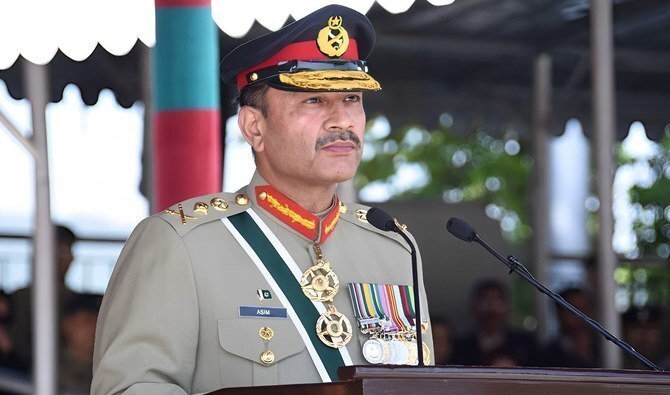ISLAMABAD: Pakistan’s Army Chief General Syed Asim Munir thanked Saudi Arabia, China, the United Arab Emirates, Turkiye and Qatar for standing by Pakistan during its “difficult times,” the military’s media wing said on Wednesday on the occasion of the country’s 78th Independence Day.
Pakistan has increasingly relied on regional allies China, Saudi Arabia and the United Arab Emirates as it suffers from a prolonged economic crisis over the past two years.
International publication Bloomberg reported earlier this month that Islamabad has secured debt rollover commitments from the three countries for a year, paving the way for its $7 billion loan program from the International Monetary Fund (IMF).
All three countries are important trade and investment allies of Pakistan and have frequently bailed Islamabad out of its macroeconomic crisis that has seen its reserves plummet, and its currency weaken over the past two years.
“We are grateful to China, Saudi Arabia, the United Arab Emirates, Qatar and Turkiye for supporting Pakistan in its difficult time,” Munir said during his speech at a parade on Independence Day eve at the Pakistan Military Academy in Kakul.
In a wide-ranging speech, the army chief said Islamabad wanted to establish peaceful relations with neighboring Afghanistan.
“Our message to them is: Do not give priority to the Fitnah-ul-Khawarij over your long-standing, benevolent and brotherly neighbor,” Munir said, referring to the Pakistani Taliban as the “Fitnah-ul-Khawarij.”
Pakistan’s ties with Afghanistan have remained strained ever since the Taliban seized Kabul in 2021. Islamabad accuses the outlawed Pakistani Taliban of launching attacks on it from sancutaries in Afghanistan, allegations that Kabul denies.
It has frequently warned Kabul to desist from providing safe havens to the Pakistani Taliban fighters and urged it to take decisive action against the militant group.
Munir also spoke about freedom of speech in the country, saying that whilst the constitution guarantees it, it also defines its limits.
The army chief’s comments come amid a ban on X in Pakistan since February when a government official held a press conference and made confessions of rigging in the general election.
The government also has reportedly begun installing a nationwide firewall to regulate Internet usage, control access to social media sites, including Facebook, YouTube, and X, and empower the government to identify IP addresses associated with what it calls “anti-state propaganda.”
The ban has been criticized by digital rights activists and journalists, who see it as an attempt to muzzle freedom of speech and restrict Internet freedoms in the country.


















